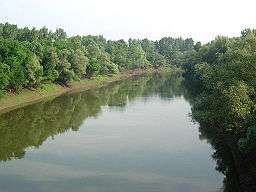Körös
| Körös | |
| Râul Criș | |
| River | |
 The Körös near Kunszentmárton | |
| Countries | Hungary, Romania |
|---|---|
| Counties | Békés, Jász-Nagykun-Szolnok, Csongrád |
| Tributaries | |
| - left | Crișul Alb (Fehér-Körös) |
| - right | Crișul Negru (Fekete-Körös), Crișul Repede (Sebes-Körös) |
| Towns | Békés, Szarvas |
| Source | Confluence of headwaters Crișul Alb and Crișul Negru |
| - location | near Gyula |
| - elevation | 85 m (279 ft) |
| - coordinates | 46°42′1″N 21°16′9″E / 46.70028°N 21.26917°E |
| Mouth | Tisza |
| - location | near Csongrád |
| - elevation | 80 m (262 ft) |
| - coordinates | 46°43′2″N 20°11′18″E / 46.71722°N 20.18833°ECoordinates: 46°43′2″N 20°11′18″E / 46.71722°N 20.18833°E |
| Length | 128.6 km (80 mi) |
| Basin | 27,537 km2 (10,632 sq mi) |
| Discharge | |
| - average | 100 m3/s (3,531 cu ft/s) |
| Progression | Tisza→ Danube→ Black Sea |
The Körös ([ˈkørøʃ]; Romanian: Criș, German: Kreisch) is a river in eastern Hungary. Its length is 128.6 km (79.9 mi) from the confluence of its two source rivers Fehér-Körös (Crișul Alb) and Fekete-Körös (Crișul Negru) to its outflow into the Tisza. Its drainage basin area is 27,537 km2 (10,632 sq mi).[1]:22 It has three source rivers, all of which have their origin in the Apuseni Mountains in Transylvania, Romania: Crișul Alb (Fehér-Körös), Crișul Negru (Fekete-Körös) and Crișul Repede (Sebes-Körös). The confluence of the rivers Fehér-Körös (Crișul Alb) and Fekete-Körös (Crișul Negru) is near the town Gyula. The Körös downstream from Gyula is also called the Kettős-Körös (Hungarian for "double Körös"). 37.3 km further downstream, near Gyomaendrőd, the Sebes-Körös (Crișul Repede) joins the Körös. The section downstream from Gyomaendrőd is also called the Hármas-Körös (Hungarian for "triple Körös"). The Körös flows into the Tisza River near Csongrád.
It was known in antiquity as the "Chrysus", Crisus, Crisia, Grisia, or Gerasus, while an archaic German name is Kreisch.